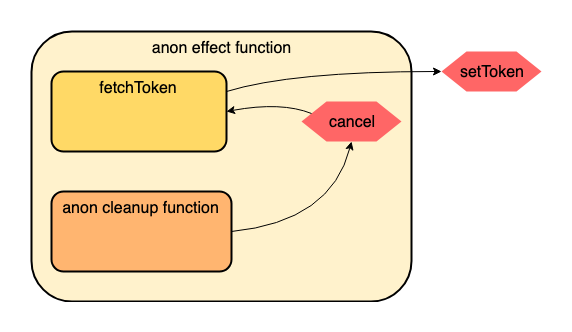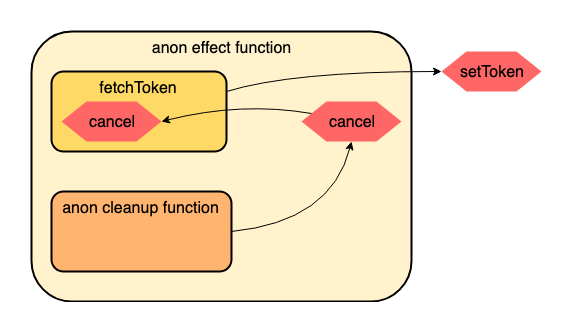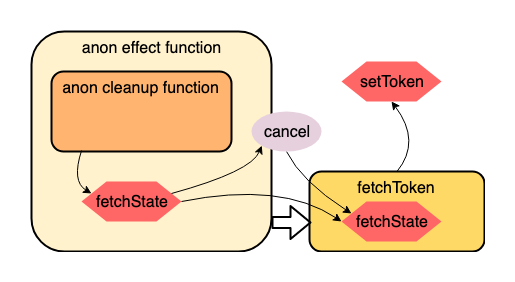Cancelling state updates in React
Understanding stale updates and closures
If you’ve been working in React, there’s a reasonable chance you’ve seen the above Javscript console error. It means that you have a component that is no longer being rendered but has some async or delayed function that is attempting to update that component’s state.
Here’s a stripped down bit of React code that will reproduce this error.
import React, { useEffect, useState } from 'react';
function Child(props) {
const [token, setToken] = useState(null);
// Load a token when this component first mounts
useEffect(() => {
async function fetchToken() {
const token = Math.floor(Math.random() * 100);
// simulate a 2-second fetch delay
const returnToken = await new Promise(r => {
setTimeout(() => r(token), 2000)
});
setToken(returnToken);
}
fetchToken();
}, [])
return (
<div>Your token: {token === null ? 'loading...' : token}</div>
);
}
function Parent(props) {
const [showChild, setShowChild] = useState(false);
return (
<>
<button onClick={() => setShowChild(show => !show)}>
{showChild ? "Hide" : "Show"}
<button/>
{showChild && (
<Child />
)}
</>
);
}
export default Parent

The error will trigger if you click the “show” button to mount the Child then click “hide” before the token value is set.
What’s happening is the anonymous function that we passed into useEffect is still being evaluated by the Javascript engine, and it still has a reference to your unmounted component. setToken is still going to be called, and it will update a value in memory. Specifically, it has formed a closure, but the bottom line is that there is memory being devoted to a component that’s gone. This is why React complains that you might have a memory leak.
It’s actually not clear to me that this particular case is problematic. When you have a subscription, poller, interval, or other kind of continuous update function running, then it’s certainly an issue if that keeps running once your component unmounts. But here it’s one-and-done, so I can imagine a garbage collector ought to be able to clean this object up once the no-op setToken method runs.
Still, it’s a little sloppy to just let setToken run into the void. This is a common enough problem that there’s a new javascript feature in the works, as of this writing, called the AbortController. However, as of this post this feature is marked as experimental so should not be used in production apps.
So what’s a memory-conscious developer to do? The most common pattern I’ve seen, and used, is to change the effect function to the following:
useEffect(() => {
let cancel = false;
async function fetchToken() {
const token = Math.floor(Math.random() * 100);
const returnToken = await new Promise(r => {
setTimeout(() => r(token), 2000)
});
if (cancel) { return; }
setToken(returnToken);
}
fetchToken();
return () => {cancel = true;};
}, [])
We’ve added a cancel variable set, a check on this variable, and a cleanup function to our effect that sets cancelled to true. Personally I dislike this syntax for cleanup functions as it abuses the semantic meaning of return (why not another arg to useEffect?), but that’s not my fight to fight.
I also dislike defining this function inside the useEffect call, and we’ll get into that in a little bit.
We’re getting deeper into closure-land here, and it pays to understand them to know how and why this works, because it wouldn’t in many other languages. I like to think of a closure as a bag of variables. The variable names don’t matter to anyone outside your bag, but as long as your closure exists you’ve got access to your bag. Here, cancel is in our bag. We defined it at the top of this anonymous function. So everything within this function, including setToken and the anonymous cleanup function has access to this variable. They all point to the same bag, so when the cleanup function runs, it’s updating the same cancel that will be read by fetchToken right before it tries to call setToken.
To really hammer in the closure thing, let’s make a small change that will break this code.
useEffect(() => {
let cancel = false;
async function fetchToken(cancel) {
const token = Math.floor(Math.random() * 100);
const returnToken = await new Promise(r => {
setTimeout(() => r(token), 2000)
});
if (cancel) { return; }
setToken(returnToken);
}
fetchToken(cancel);
return () => {cancel = true;};
}, [])
All we’ve done is passed cancel into the function rather than accessing it from the outer namespace. Why would we do this? In my case, I recently needed to re-use the same fetch function in two different effects: one for when a new resource was being loaded and display, and one for when the current resource was being refreshed after a complex server action. I want to define the fetch function independently of the effect for better isolation of concerns.
But as written, this breaks. It breaks because as soon as we pass in the variable cancel as an argument to fetchToken, cancel becomes a declared variable in fetchToken’s bag. It’s a completely separate variable to the one in the outer bag of the effect function.
Let’s illustrate.


Rounded rectangles represent scope boundaries that help understand what a given closure has access to. In the image on the right, the name cancel takes on new meaning inside the fetchToken function. Thus reassigning that variable name to a new value outside that function does not affect the value of the named variable inside.
To fix this, I we can pass in an Object where cancel is a field. Reassigning fetchState would have the same non-effect, but modifying its data is a different story. Both references to fetchState point to the same data – the same copy of the cancel field.
function Child(props) {
const [token, setToken] = useState(null);
useEffect(() => {
const fetchState = {cancel: false};
fetchToken(fetchState);
return () => {fetchState.cancel = true;};
}, [])
async function fetchToken(fetchState) {
const token = Math.floor(Math.random() * 100);
const returnToken = await new Promise(r => {
setTimeout(() => r(token), 2000)
});
if (fetchState.cancel) { return; }
setToken(returnToken);
}
return (
<div>Your token: {token === null ? 'loading...' : token}</div>
);
}
Testing this out, it works beautifully. (Add in a console.log in the cancel check to convince yourself).

Here, the cancel value is illustrated as a lavender ellipse as it is not a named variable that either closure has direct access to. Instead it is a value (field) that both versions of fetchState point to. I actually rather like this solution better since it allows separation of the fetch function from the effect function’s scope, making it far more reusable and testable.
Until AbortControllers come onto the scene in a more stable way, that’s all, folks!